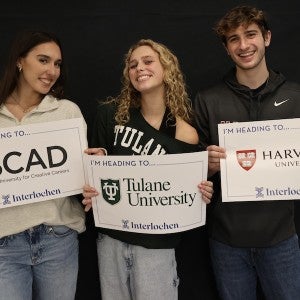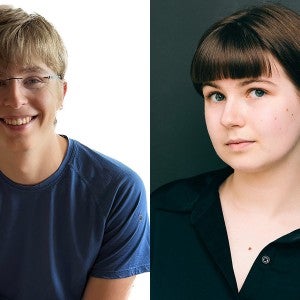Overcoming learning challenges and finding success at Interlochen, beyond
Interlochen Arts Academy’s faculty and Academic Center for Enrichment help students overcome difficulties in the classroom.
Interlochen Arts Academy students are united by their shared passion and talent for the arts. But while some are naturals in the classroom, others have challenges to overcome both artistically and academically.
For students experiencing difficulty, Interlochen offers a strong support network headed by School Psychologist Dr. Michael Kern.
“For several years, we’ve been working to develop supports for students who are having difficulty in their classes,” Kern said. “For some of our students, their challenge might stem from a learning disability. For others, it might be because they’re coming from a less rigorous school or a totally different school environment. Our goal is to help them figure out how to navigate our support system and to get the help they need.”
The support system begins with Interlochen’s faculty, who Kern says are some of the school’s best resources. “Our faculty really want their students to be successful, and they really work to make that happen,” he said. “Every teacher holds daily office hours, and students can go to them to get extra help. Many of them also come to campus in the evenings to offer tutorials.”
The next level of support is the Academic Center for Enrichment (ACE), a space that unites students with peer tutors, professional mentors, and learning specialists. “At ACE, we help students with study skills and organization through structured study halls,” Kern said. “Instead of just teaching them study skills in isolation, we apply these skills to the work that they have day-to-day.”
The goal, Kern says, is not just to complete homework assignments, but to develop long-term success strategies. “Our core philosophy is to help students figure out how to help themselves,” he said. “What we try to do is teach students skills that will help them be successful not just at Interlochen, but also when they leave for college.”
One such student was recent Interlochen Arts Academy graduate Evan Schumacher.
“When I was at the Academy, I worked with Dr. Kern to understand how ADHD and generalized anxiety disorder affect the way I learn,” Schumacher said. “A big part of the work that I did with Dr. Kern focused not only on the areas that I had trouble with, but also the areas where I really succeeded.”
For example, while Schumacher struggled with writing, he excelled at public speaking. “I spent a lot of time working on making my writing sound the way I would speak,” he said. “It made me a stronger writer, a stronger speaker, and it’s helped me be much more successful in college.”
Schumacher is currently a sophomore at Southern Methodist University, where he is studying dance and philosophy. “Over my time at Interlochen, I went from being somebody who was so afraid to write that I couldn’t type anything on a computer to a philosophy major with lots of writing to do,” he said. “I've become so much stronger in things that I used to be completely unable to do.”
Another one of Kern’s success stories is alumna Sophie Amundson, who, like Schumacher, has ADHD. “I really had no idea how to handle my ADHD,” she said. “I understood what it was, but I didn’t realize exactly how it affected me.”
Through her work with Kern, Amundson was able to understand her challenges and develop strategies to overcome them. “A few things that I found very helpful were simple things like color-coding my notes or making a really descriptive outline of a paper before I wrote it,” she said. “Those simple things made me feel like I had more control over my assignments, which in turn helped me to actually complete them.”
Like Schumacher, Amundson is now a college student at George Mason University, and credits the skills she developed at Interlochen for helping her adjust to college. “College class sizes are a lot bigger than the class sizes at Interlochen,” she said. “But because of what I was able to learn here at Interlochen, I didn’t feel overwhelmed going into those big classes. I knew how to ask the teacher for help if I needed it, and how to help myself out of certain situations.”
For students entering Interlochen with known academic challenges, Kern recommends beginning conversations with his team as soon as the student is enrolled. For students experiencing new challenges, Kern offers an open door and a word of encouragement.
“The students who find the most success are the ones who can reach out on their own, show up, and get the help they need,” he said. “That can be challenging, but know that we want to help you.”
Amundson agrees. “One thing I can say with all certainty is that the people at Interlochen want you to succeed,” she said. “Even if you don't feel you have the courage to ask for help, there's always someone who will be there for you.”




